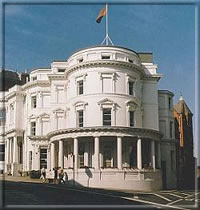Parliament and Independence
The Island’s independence
The most important issue to the House of Keys was not the question of free elections, but the continued independence of the Island. They wanted to ensure that the Isle of Man did not become merely another part of England ruled from Westminster.
By the 1860s, after decades of resistance, the majority of the Keys were agreeable to members being elected. The Lieutenant Governor, Henry Loch, gained the approval of the British Home Office to an Act of Tynwald to allow elections. However, electoral reform did not mean “Votes for All.” The vote was only given to male ratepayers holding property valued at £8 (a considerable sum at the time).
What may have made the Keys more agreeable to becoming a popularly elected body was that the British Government had hinted strongly that it would not be prepared to release funds for work on the Island, such as the much needed harbour improvements, if the Keys continued to be a self-perpetuating non-elected body.
 Although the majority of the Keys supported the changes, some did not accept the House of Keys Election Act of 1866. The most notable dissenter was the Speaker Edward Moore Gawne of Kentraugh, who resigned from the Keys and from public life in protest and outrage at the notion of popular elections. He also turned down the offer of a Knighthood.
Although the majority of the Keys supported the changes, some did not accept the House of Keys Election Act of 1866. The most notable dissenter was the Speaker Edward Moore Gawne of Kentraugh, who resigned from the Keys and from public life in protest and outrage at the notion of popular elections. He also turned down the offer of a Knighthood.
The House of Keys Election Act also meant that the Keys ceased to be the supreme Court of Appeal but it gained the right to levy taxes and to decide and vote on its own expenditure.
1866 marked the end of over 30 years of political unrest and the Keys became an elected body. But the changes were not yet over. Demands were being made for the Keys to move to Douglas, the Island’s rapidly expanding commercial capital.
The move to Douglas
 By the mid 1800s the Island’s capital, Castletown, had declined from the smart Georgian town it had been. In contrast, the previously unfashionable fishing port of Douglas was rapidly becoming the commercial centre of the Island where all the ‘new money’ was to be found.
By the mid 1800s the Island’s capital, Castletown, had declined from the smart Georgian town it had been. In contrast, the previously unfashionable fishing port of Douglas was rapidly becoming the commercial centre of the Island where all the ‘new money’ was to be found.
The Governor, the law courts and the Island’s ‘money-makers’ had all moved to Douglas, which was growing rapidly with new hotels for the tourist industry and fashionable Victorian residences. The Keys wanted to be at the centre of Island life and therefore needed to move to Douglas.
The House of Keys building in Castletown had never fully satisfied the Members and by the 1870s it was described as being dilapidated with the wallpaper hanging off the wall. The state of the building had always been a matter of concern and distress to the Keys, not helped by episodes such as the internal cesspit in the House overflowing in 1840.
In 1874, the Keys moved to Douglas, eventually occupying the old Bank of Mona building on Prospect Hill. This building provided an imposing and impressive new home for the Keys, and continues to provide the debating chamber for the House of Keys and Tynwald to this day.
